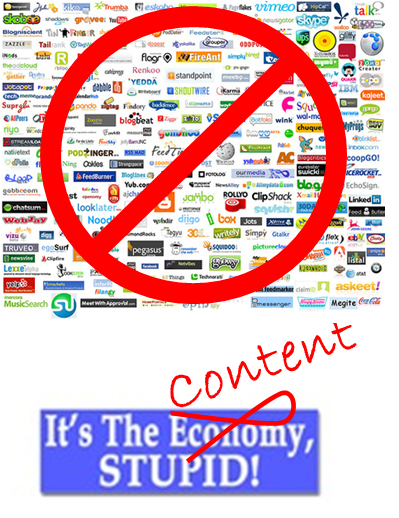 As I delve deeper into the world of social media, I continue to be amazed by how little we focus on the fact that content is still king. I, therefore, felt compelled to borrow the phrase attributed to James Carville, Bill Clinton’s political strategist during the 1992 US presidential election.
As I delve deeper into the world of social media, I continue to be amazed by how little we focus on the fact that content is still king. I, therefore, felt compelled to borrow the phrase attributed to James Carville, Bill Clinton’s political strategist during the 1992 US presidential election.
While social media technologies are enabling an exponential amplification of conversations not previously possible, therein lies the problem: we focus too much on these enabling technologies and not on the underlying conversations themselves. According to this year-old study, only 8% of all tweets are ‘good’, and engagement levels within the 75 million Twitter user base are actually quite low, with 80% of these users having tweeted less than 10 times. One of the key challenges social media, and not just Twitter has, is to drive those engagement levels higher. This can only happen if we start focusing on meaningful conversations.
Wikipedia defines conversation as:
…communication between two or more people. Conversations are the ideal form of communication in some respects, since they allow people with different views on a topic to learn from each other.
In the same article, Wikipedia classifies conversations in four major categories:
- Conversations about subjective ideas, which often serve to extend understanding and awareness.
- Conversations about objective facts, which may serve to consolidate a widely-held view.
- Conversations about other people (usually absent), which may be either critical, competitive, or supportive. This includes gossip.
- Conversations about oneself, which sometimes indicate attention-seeking behavior.
I would challenge each one of us to compare our conversations both on- and offline. I would not be surprised to see that most of our offline conversations center on subjective ideas and objective facts (and hence content), while our online conversations are heavily skewed towards gossip and self-promotion.
While some of the hype around the enabling technologies is understandable, it is only when we focus the social media conversation on the underlying conversations and not the tools (pun intended), we will be able to truly reap the benefits.
As always, your thoughts and comments are welcome.
Ted – fully concur. I’ve been a passive participant in the social media movement primarily struggling to break throug the clutter and hype that has diluted any meaningful content out there. You’ve made the point I am not alone.
The statistics you share are not surprising, however would like to double click on the definition of a good “tweet.” Fundamentally I believe we have entered a world where the lines between personal and professional/business communication have been decimated. Take Facebook vs Linkedin as an example. No longer are they exclusive platforms for personal vs business use as originally percieved by many. The ubiquitous tweet will continue to run wild.
Clearly the opportunity now is to acknowledge the rules (or lack of)in this new world and determine how we effectively mine and shape meaningful conversations.
Sumith,
You are absolutely correct, the lines between our personal and professional personas are at least blurred if not ‘decimated’ as you mentioned. The challenge I believe is where you as an individual want to be in that continuum (although my premise is that even in my ‘personal life’ our conversations do contain some content)
Ted
I can tell you from my own experience that this is true. I’ve been pretty much on message with my Tweets over the last couple of years, talking about social media, B2B marketing and a few related topics. Very rarely do I post a personal Tweet.
When I recently used a Twitterlyzer tool, I learned that I had the most unsubscribes from my feed when I posted irrelevant category 4 (about myself) Tweets. I think it’s important to remember that by being on social media we build our own brand.
Who do you want people to see you as? This is not so different from establishing a reputation at the office; only virtual.
Natascha,
Thanks for your comment, and for backing up my argument with data! This is indeed a challenge and I agree that there should only be one ‘you’ and that same person should come through in all conversations regardless of where they happen.
Ted